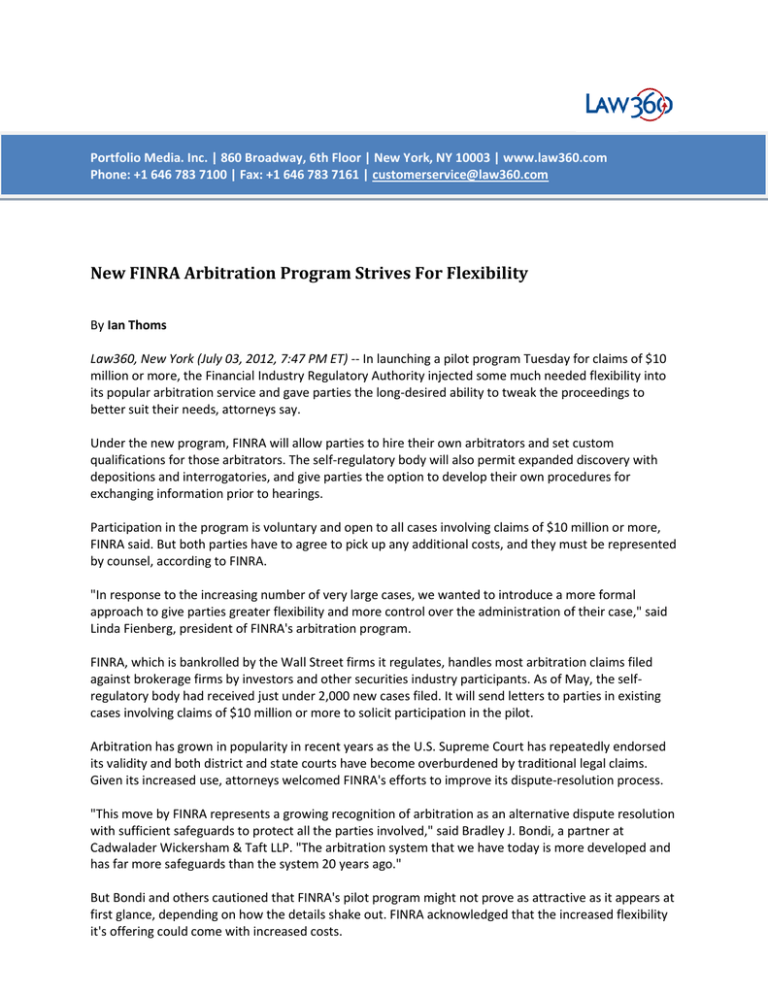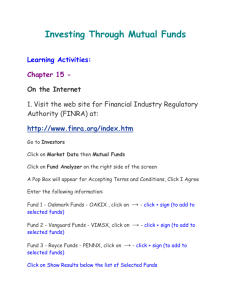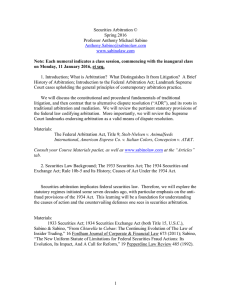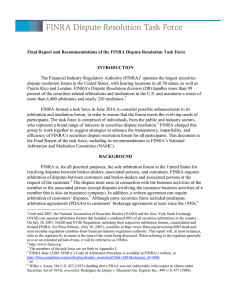Portfolio Media. Inc. | 860 Broadway, 6th Floor | New...
advertisement

Portfolio Media. Inc. | 860 Broadway, 6th Floor | New York, NY 10003 | www.law360.com Phone: +1 646 783 7100 | Fax: +1 646 783 7161 | customerservice@law360.com New FINRA Arbitration Program Strives For Flexibility By Ian Thoms Law360, New York (July 03, 2012, 7:47 PM ET) -- In launching a pilot program Tuesday for claims of $10 million or more, the Financial Industry Regulatory Authority injected some much needed flexibility into its popular arbitration service and gave parties the long-desired ability to tweak the proceedings to better suit their needs, attorneys say. Under the new program, FINRA will allow parties to hire their own arbitrators and set custom qualifications for those arbitrators. The self-regulatory body will also permit expanded discovery with depositions and interrogatories, and give parties the option to develop their own procedures for exchanging information prior to hearings. Participation in the program is voluntary and open to all cases involving claims of $10 million or more, FINRA said. But both parties have to agree to pick up any additional costs, and they must be represented by counsel, according to FINRA. "In response to the increasing number of very large cases, we wanted to introduce a more formal approach to give parties greater flexibility and more control over the administration of their case," said Linda Fienberg, president of FINRA's arbitration program. FINRA, which is bankrolled by the Wall Street firms it regulates, handles most arbitration claims filed against brokerage firms by investors and other securities industry participants. As of May, the selfregulatory body had received just under 2,000 new cases filed. It will send letters to parties in existing cases involving claims of $10 million or more to solicit participation in the pilot. Arbitration has grown in popularity in recent years as the U.S. Supreme Court has repeatedly endorsed its validity and both district and state courts have become overburdened by traditional legal claims. Given its increased use, attorneys welcomed FINRA's efforts to improve its dispute-resolution process. "This move by FINRA represents a growing recognition of arbitration as an alternative dispute resolution with sufficient safeguards to protect all the parties involved," said Bradley J. Bondi, a partner at Cadwalader Wickersham & Taft LLP. "The arbitration system that we have today is more developed and has far more safeguards than the system 20 years ago." But Bondi and others cautioned that FINRA's pilot program might not prove as attractive as it appears at first glance, depending on how the details shake out. FINRA acknowledged that the increased flexibility it's offering could come with increased costs. The selection of a non-FINRA arbitrator or outside venue could drive up costs, attorneys said. Depositions and interrogatories would also boost the price tag, they said. "Of course, the devil is in the details," Bondi said. "The choice of arbitrators is critical, and arbitration can be as costly, if not more costly, than actual litigation if sufficient rules aren't in place." While appreciative of the increased flexibility, some attorneys said they weren't sure they would avail themselves of all of the options in the pilot program. They said FINRA's streamlined process is sometimes the best option. "I do like the idea of expanded discovery and maybe some deposition. The flexibility is nice to have," said Christopher B. Wells, head of Lane Powell PC's broker-dealer group. "But after trying a lot of cases in court and a lot of cases in arbitration, I think I can get by without depositions. Sometimes depositions help prepare the other side, and FINRA arbitration [cases] are really more dependent on document discovery." Wells noted that the pilot program, while welcome, does little to address the larger issues surrounding arbitration. For one, appealing an arbitration decision will remain the sticky proposition it currently is. Few arbitration awards are overturned, and Wells expects that will continue to be the case under FINRA's program. But Wells and other attorneys said they were glad to see FINRA was tinkering with its dispute-resolution process in hopes of improving it. They said arbitration is a critical alternative to the clogged judicial system. "Any move to alleviate the burden on the overworked judicial system is positive, provided that the parties have adequate safeguards," Bondi said. --Editing by John Quinn and Lindsay Naylor. All Content © 2003-2012, Portfolio Media, Inc.






